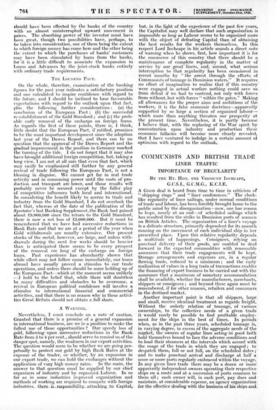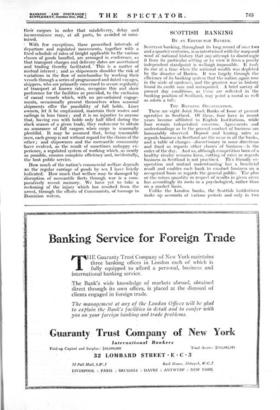COMMUNISTS AND BRITISH TRADE
LINER TRAFFIC IMPORTANCE OF REGULARITY BY THE RT. HON. THE VISCOUNT INCHCAPE, G.C.S.I., G.C.M.G., K.C.I.E.
A GOOD deal is heard from time to time in criticism of " shipping rings " and " liner conferences." The clock- like regularity of liner sailings, under normal conditions of trade and labour, has been forcibly brought home to the public mind by the disorganization---now, one has reason to hope, nearly at an end—of scheduled sailings which' has resulted from the strike in Dominion ports of seamen on British Articles. The organization of a liner's voyage - is a delicate structure, primarily dependent for its smooth . running on the movement of each individual ship in her prescribed place. Upon this relative regularity depends a multitude of happenings. Consignees, relying on punctual delivery of their goods, are enabled-to deal forward in the expected commodities with reasonable assurance that their trade engagements will be kept.. Storage arrangements and expenses are, in a regular flowing trade, reduced to a minimum ; and the early realization of values in a long train of transactions enables the financing of export business to be carried out with the assurance that a maximum of monetary accommodation' shall be available, whether for manufacturers, merchants, shippers or consignees ; and beyond these again must be remembered, if for other reasons, retailers and consumers in the destined market.
Another important point is that all shippers, large and small, receive identical treatment as regards freight.' Without the orderly relation of tonnage, of various : ownerships, to the collective needs of a given trade it would rarely be possible to find profitable employ- ment fOr the ships in the best of times. In periods when, as in the past three years, scheduled tonnage is, in varying degree, in excess of the aggregate needs of the itiatket,- the owners of regular lines acting tin good faith hold themselves bound to face the adverse conditions and' to load their steamers at the intervals which accord with the usage of the trade in which they are engaged ; to' despatch them, full or not full, on the scheduled dates r 'and to make punctual arrival and discharge at half a score or more ports regularly embraced within the voyage.' In any given liner trade there may be a dozen or more' apparently independent owners operating their respective ships on a route and at a succession of ports common to them all ; each owner will, in each port, pay dues and maintain, at considerable expense, an agency organization' for the effective dealing with. the business-of- his ships and_ their cargoes in order that misdelivery, delay and inconvenience may, at all ports, be avoided or mini- mized.
' With few exceptions, these prescribed intervals of departure and regulated movements, together with a fixed schedule of rates of freight applicable to the various classes of goods handled, are arranged in conference, so that transport charges and delivery dates are ascertained and trading thereby facilitated. This is a matter of mutual interest; as shipowners shoulder the risk of variations in the flow of merchandise by working their vessels through a series of programmed and dated voyages, shippers, who are primarily concerned to secure regularity of transport at known rates, recognize this and show preference for the facilities so provided, to the exclusion of casual vessels which, with no pre-ordained engage- ments, occasionally present themselves when seasonal shipments offer the possibility of full holds. Liner owners, let it be emphasized, maintain their routes and sailings in lean times ; and it is no injustice to anyone that, having run with holds only half filled during the slack season of a given trade, they endeavour to obtain an assurance of full cargoes when cargo is seasonally plentiful. It may be assumed that, being reasonable 4nen, each group is not without regard for the claims of the .other ; and shipowners and the mercantile community have evolved, as the result of sometimes unhappy ex- perience, a regulated system of working which, as nearly as possible, ensures complete efficiency and, incidentally, the best public service.
How much of the nation's commercial welfare depends An the regular carriage of goods by sea I have briefly indicated. How much that welfare may be damaged by 'disruption of mercantile fleets through war is a com- paratively recent memory. We have yet to take a reckoning of the injury which has resulted from the arrest, through the efforts of Communists, of tonnage in Dominion waters.































































 Previous page
Previous page